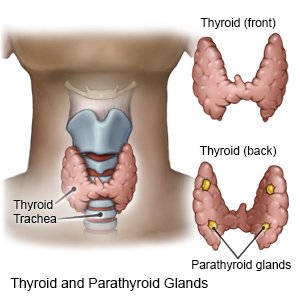Hyperthyroidism
Medically reviewed by Drugs.com. Last updated on Aug 4, 2025.
Hyperthyroidism is a condition that develops when your thyroid hormone levels are high. Thyroid hormones help control body temperature, heart rate, growth, and weight.
 |
WHILE YOU ARE HERE:
Informed consent
is a legal document that explains the tests, treatments, or procedures that you may need. Informed consent means you understand what will be done and can make decisions about what you want. You give your permission when you sign the consent form. You can have someone sign this form for you if you are not able to sign it. You have the right to understand your medical care in words you know. Before you sign the consent form, understand the risks and benefits of what will be done. Make sure all your questions are answered.
You may need extra oxygen
if your blood oxygen level is lower than it should be. You may get oxygen through a mask placed over your nose and mouth or through small tubes placed in your nostrils. Ask your healthcare provider before you take off the mask or oxygen tubing.
A heart monitor
is an EKG that stays on continuously to record your heart's electrical activity.
Nutrition:
You may need to eat more to give your body the extra energy it needs. Foods high in protein will help prevent weight loss. A healthcare provider may help set up a meal plan with you.
Related medications
Medicines:
- Anxiety medicine may help you feel calm and relaxed.
- Antithyroid medicine may help decrease your thyroid hormone level.
- Heart medicines may help slow your heart rate.
Tests:
- Blood tests may be done to monitor your thyroid hormone level.
- A sample of your thyroid gland tissue may show what is causing your condition and the best treatment plan for you.
- A thyroid scan may show how well your thyroid is working. Radioactive liquid is put into your IV or is given to you to drink. The part of your thyroid gland that still works absorbs the dye. Two to 48 hours later, healthcare providers use a machine called a scintillator to take pictures of your thyroid.
- An x-ray may be done to check your lungs and heart.
- An EKG records your heart rhythm and how fast your heart beats.
Treatment:
- Radioactive iodine is given to damage or kill some thyroid gland cells. This may decrease the amount of thyroid hormone produced. Tell your healthcare provider if you know or think you are pregnant. This medicine can be harmful to an unborn baby.
- Surgery may be done to remove all or part of the thyroid gland.
Treatment options
The following list of medications are related to or used in the treatment of this condition.
RISKS:
Even after successful treatment, you may still have signs and symptoms or they may return. Without treatment, your signs and symptoms may get worse. Your eyes may continue to bulge and affect your eyesight. You may lose too much weight and become weak. Your heart may be damaged. You may also have a thyroid storm. Your temperature may go very high, your heart may beat fast, and you may have problems thinking. You may go into a coma, which can be life-threatening.
CARE AGREEMENT:
You have the right to help plan your care. Learn about your health condition and how it may be treated. Discuss treatment options with your healthcare providers to decide what care you want to receive. You always have the right to refuse treatment.© Copyright Merative 2025 Information is for End User's use only and may not be sold, redistributed or otherwise used for commercial purposes.
The above information is an educational aid only. It is not intended as medical advice for individual conditions or treatments. Talk to your doctor, nurse or pharmacist before following any medical regimen to see if it is safe and effective for you.
Learn more about Hyperthyroidism
Treatment options
Care guides
Symptoms and treatments
Further information
Always consult your healthcare provider to ensure the information displayed on this page applies to your personal circumstances.
